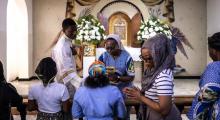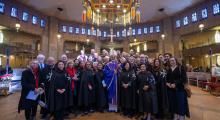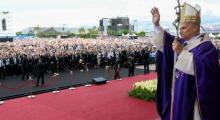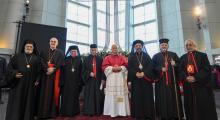Issued by the Catholic Center for Studies and Media - Jordan. Editor-in-chief Fr. Rif'at Bader - موقع أبونا abouna.org
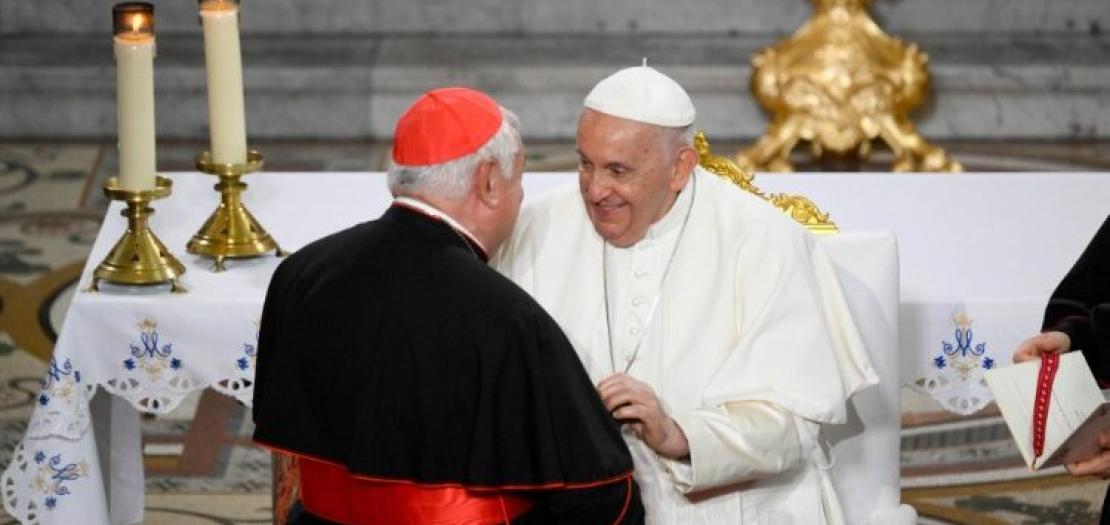
Pope Francis’ first appointment in Marseille on Friday, September 22, was with diocesan clergy in the Basilica of Notre-Dame-de-la-Garde (“Our Lady of the Guard”).
In his address during the Marian Prayer service, the Holy Father recalled that the church in which the meeting took place was not founded as the result of a miracle or apparition, but because the people of God in Marseille, “sought and found here… the presence of the Lord through the eyes of His Holy Mother”.
The Pope focused his remarks on the “Marian dimension” of ministry, reflecting on the “intersection of gazes” brought about by Mary: the gaze of Jesus upon His people, and the gaze of the people toward the Lord.
Jesus, the Pope said, gazes tenderly upon all men and women, not judging us but lifting up the lowly. The Church’s ministers are called to reflect this gaze, he said, remembering that they have themselves experienced it and can in turn be men and women of compassion.
“Let us open the doors, not only of our churches and rectories, but especially of the heart, to show through our meekness, kindness, and acceptance the face of the Lord”, he encouraged them.
Pope Francis encouraged priests to always offer God’s forgiveness, and to rediscover “the joy of illuminating lives through the Sacraments.” And he encouraged them to be close to everyone, especially the poor and less fortunate.
Turning to the second gaze, “that of men and women who turn to Jesus”, Pope Francis highlighted the role of the Church’s ministers as intercessors.
Like Mary at the wedding of Cana, they “are called to be the voice of intercession for others”, ensuring that when they pray, they bring with them the needs of all those providence has placed in their path.
The Pope summarized his reflections by pointing to three images of Mary in the Basilica.
The great statue of Mary that “towers over its summit” reminds clergy to “bring the blessing and peace of Jesus everywhere”. An image of Mary holding the Child Jesus and a bouquet of flowers demonstrates how Mary presents Jesus to us, and also presents us, like a bouquet of flowers, to Him. And finally, the “splendor” of the image of Mary on the altar invites Christians to “become a living Gospel” by going out to share Jesus’ message with others.
Pope: Migration must be addressed with humanity, solidarity
In the second public event of his Apostolic Journey to Marseille, Pope Francis gathered on Friday, September 22, with members of religious and local Church and lay organizations involved in the care of seafarers, migrants, and refugees for an interfaith moment of recollection at the French city’s memorial site commemorating sailors and migrants lost at sea.
Among those attending the gathering, held at a monument in front of the Basilica of Notre Dame de la Garde, were members of the interreligious non-governmental organization Marseille Espérance, and delegations of Catholic Stella Maris, Caritas Gap-Briançon, and of the network Associations de secours en mer pour un temps de prière pour les migrants morts en mer (Sea rescue associations for the prayer for migrants who lost their lives at sea), as well as members of the diocesan pastoral service for migrants.
In his remarks, Pope Francis reiterated the urgent need to address the tragedies of migration, which have transformed the Mediterranean into a “cemetery”, with concrete actions, not words, but, most importantly, with humanity.
He underscored that immigrants who lose their lives at sea as they seek a better future are not mere numbers, but people with faces and names fleeing from conflicts, poverty and environmental disasters.
In this epochal migration crisis, the Pope said, while migrants find themselves at a crossroads between life and death, as recalled by the protagonist of the book “Hermanito” (“Little Brother”) at the end of his perilous journey from Guinea to Europe, European countries stand at a crossroads of civilization.
"On the one hand, there is fraternity, which makes the human community flourish with goodness; on the other, indifference, which bloodies the Mediterranean.”
He insisted that rescuing people in danger at sea is a duty both of humanity and civilization. “God will bless us, if on land and at sea we know how to take care of the weakest, if we can overcome the paralysis of fear and the disinterest that, with velvet gloves, condemns others to death,” the Pope said.
To address the crisis, Pope Francis continued, representatives of different religions, and specifically of the three Mediterranean Abrahamic monotheisms, which all teach hospitality and love for the stranger in the name of God, are called to set an example.
“We believers must be exemplary in mutual and fraternal welcome,” he stressed, decrying “the woodworm of extremism and the ideological plague of fundamentalism that corrodes the authentic life of communities.”
The Pope referred specifically to the complex multi-cultural and multi-religious reality of Marseille, faced today with increasing inter-communal and social tensions, saying that the French port city “stands at a crossroads: encounter or confrontation”.
In this regard, Pope Francis praised and encouraged the work carried out by the several organizations involved in assisting migrants and promoting peaceful coexistence between communities, and specifically the inter-faith NGO Marseille-Espérance.
“You are the Marseille of the future,” he said. “Strive ahead without discouragement, so that this city may be for France, Europe and the world a mosaic of hope.”
The Pope cited Jules Isaac, a local French Jewish historian known internationally for his tireless work to promote Jewish-Christian relations after World War II, as a “pioneer and witnesses of dialogue”.
Wrapping up his speech, Pope Francis therefore expressed his hope that Europe may address the current challenges posed by mass migration in the Mediterranean in a spirit of solidarity breaking down walls and building bridges, as invoked by David Sassoli, the late President of the European Parliament who passed away in 2022, at the Meeting of reflection and spirituality: ‘The Mediterranean, A Frontier of Peace’, organised in the city of Bari, in 2020 by the Italian Bishops Conference (CEI).



